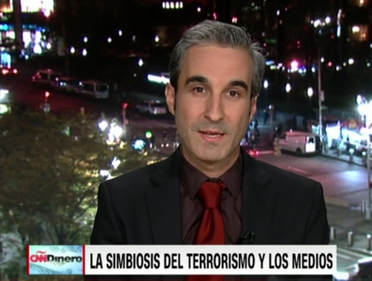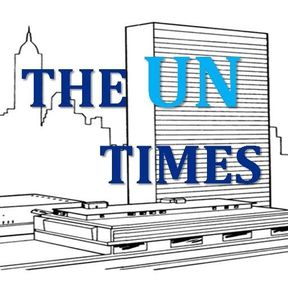PORTFOLIO OF PUBLISHED WORK
|
I am the editor of @TheUNTimes, Twitter's leading independent feed on breaking news and insights that shape the United Nations system. @TheUNTimes has been quoted in: 1) Leading global outlets like the NBC, CBS, Yahoo News, Public Radio International, Germany’s Deutsche Welle, Italy’s RAI and Russia’s RT; 2) the main media outlets of India, Japan, Spain, Australia, The Netherlands, Mexico, Venezuela, Portugal, New Zealand, Hungary, Bulgaria, the Czech Republic, Paraguay, Serbia, Slovakia and Ukraine; 3) as well key global organizations like UNICEF, Human Rights Watch and the International Peace Institute. |
|
Turkey’s Refugee Camps at the Dawn of Summer – Washington Report on Middle East Affairs On late June, I visited some of the 23 camps that Turkey operates within the country to provide shelter to almost 250,000 refugees, mostly Syrians fleeing the brutal war next door. The Syrian conflict is one of the biggest tragedies of our time. Since the beginning of the fighting in March 2011, approximately half of the country’s population (estimated in 22 million) has been forced to flee their homes. More than five million live as refugees in neighboring countries. Another 6.3 million are displaced inside Syria. The UN Secretary-General speaks out on Afghanistan - Asia Times Every three months the United Nations Secretary General (UNSG) issues a report on the situation in Afghanistan and its implications for international peace and security. Although available online, few outside UN spheres and foreign embassies in Kabul take the trouble to go through it from back to back. Yet these reports are among the most reliable, comprehensive and insightful overviews on the complexities tearing apart the country today. What you will find below is a journalistic digest of the latest UNSG report on Afghanistan. |
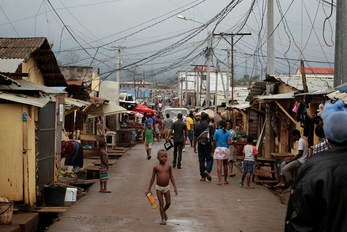 © Associated Press
© Associated Press
Guinea Ecuatorial cumple 49 años: Entrevista al asesor de la ONU
sobre su desarrollo humano - Huffington Post (Spain)
Con motivo del 49 aniversario de la independencia de este país africano (12
de Octubre), entrevisto a Domingos Mazivila, asesor económico para la
oficina en Guinea Ecuatorial (además de São Tomé y Principe) del Programa
de las Naciones Unidas para el Desarrollo (PNUD).
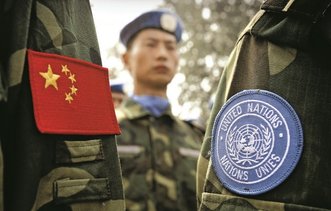 © Peter Parks/AFP/Getty
© Peter Parks/AFP/Getty
China can shine on the UN stage, as Trump puts America first - South China Morning Post (SCMP)
While a newly parochial US offers Beijing the opportunity to assume the global mantle, it remains to be seen whether it can jettison its ‘China first’ stance and allay human rights concerns.
Donald Trump’s “America First” maxim leaves a vacuum on the global stage that China appears willing to fill, and the UN can serve China well in seizing that global leadership role.

The Symbiotic Relationship between Western Media and
Terrorism - Carnegie Council for Ethics in International Affairs
This column has been cited in CNN (here), Columbia Journalism Review (here), King’s College London (here), Forbes (here), Stratfor (here), New Europe (here) Chicago ORT Technical Institute, Cision PRWeb (here), Saad Al-Abdullah Academy for Security Sciences, Kuwait (here), University of Leuven, Belgium (here), Charles University, Czech Republic (here), University of Athens, Greece (here), Media Council of Kenya (here), Airlangga University, Indonesia (here), In Homeland Security (here), News Activist (here) – in addition to three books: Community Policing (here), Examining Global Peacemaking in the Digital Age (here), and Terrorism And The Media A Dangerous Symbiosis (here)
Terrorism - Carnegie Council for Ethics in International Affairs
This column has been cited in CNN (here), Columbia Journalism Review (here), King’s College London (here), Forbes (here), Stratfor (here), New Europe (here) Chicago ORT Technical Institute, Cision PRWeb (here), Saad Al-Abdullah Academy for Security Sciences, Kuwait (here), University of Leuven, Belgium (here), Charles University, Czech Republic (here), University of Athens, Greece (here), Media Council of Kenya (here), Airlangga University, Indonesia (here), In Homeland Security (here), News Activist (here) – in addition to three books: Community Policing (here), Examining Global Peacemaking in the Digital Age (here), and Terrorism And The Media A Dangerous Symbiosis (here)
 © Emmanuel Tobey/UNMIL
© Emmanuel Tobey/UNMIL
The agony of hope: India and its UN Security Council bid - Asia Times
India’s ultimate diplomatic aspiration is about to be revisited as the new Secretary-General of the United Nations (UN) pledges to reform the world body in the face of a hostile UN-Trump administration in the US. India’s growing regional and global weight has placed Delhi in the pole position to obtain a permanent seat in the United Nations Security Council (UNSC), the world’s chief diplomatic stage.
The country has in António Guterres, the new UN boss, a likely champion of India’s case to join the Council – in early January, Guterres told to Japan’s Vice Foreign Minister that it is natural for the UNSC to be reformed as its composition has been unchanged for half a century
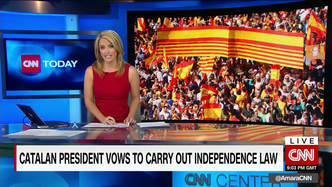
Medios globales retratan la soledad internacional del Govern -
Huffington Post (Spain)
Uno de los fracasos más estrepitosos del gobierno independentista de Carles
Puigdemont ha sido su incapacidad de ganarse cualquier tipo de reconocimiento internacional. El apoyo dado al gobierno español esta semana por parte de la primera ministra Británica es solo una muestra de esta realidad.
Huffington Post (Spain)
Uno de los fracasos más estrepitosos del gobierno independentista de Carles
Puigdemont ha sido su incapacidad de ganarse cualquier tipo de reconocimiento internacional. El apoyo dado al gobierno español esta semana por parte de la primera ministra Británica es solo una muestra de esta realidad.
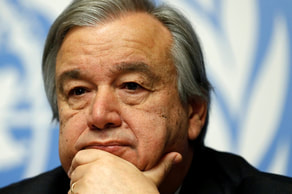 © UN
© UN
The new UN chief - The challenges that lie ahead - The Jakarta Globle
On Jan. 1, António Guterres, a former Portuguese Prime Minister, became the 9th Secretary-General of the United Nations. He is tasked to prevent the world organization from fading away into irrelevance in the face of a new US administration likely to weaken the organization from inside out.
Yet if Guterres is to really overhaul the United Nations, he will have to work particularly hard in the following three fronts: Syria, The Trump administration and a flawed peacekeeping system.
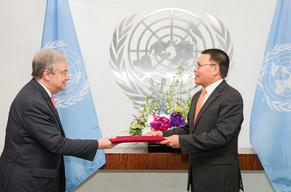 © UN
© UN
Interview with Malaysia’s Ambassador to the United Nations - UN Tribune
I sat down in New York with Malaysia´s Ambassador to the United Nations, Mr. Dato’ Muhammad Shahrul Ikram Yaakob.
Among other issues, we talked about Kuala Lumpur’s role in the United Nations Security Council during its 2015-16 membership as well as the Council’s controversial resolution on Palestine last December; Malaysia’s sizable involvement in peacekeeping operations around the word; and the country’s coordination with the U.N. in the aftermath of the assassination of the North Korean leader’s half-brother in Kuala Lumpur.
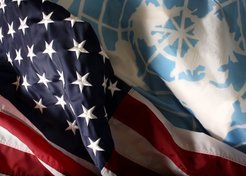
Assessing U.S.-UN Relations in a Guterres-Trump Era - Diplomatic Courier
On January 1st Antonio Guterres, a former Portuguese Prime Minister, will become the new United Nations Secretary-General. He will inherit an organization alarmed by the prospects of a hostile Trump administration in the United States that could threat its financial survival and hollow out crucial global achievements.
Trump’s “America First” rhetoric during the campaign has probably kept Guterres on his toes. Many of Trump’s stances conflict with the values and positions of the United Nations (UN), be it climate change, refugees, the Iranian nuclear deal, or human rights.
On January 1st Antonio Guterres, a former Portuguese Prime Minister, will become the new United Nations Secretary-General. He will inherit an organization alarmed by the prospects of a hostile Trump administration in the United States that could threat its financial survival and hollow out crucial global achievements.
Trump’s “America First” rhetoric during the campaign has probably kept Guterres on his toes. Many of Trump’s stances conflict with the values and positions of the United Nations (UN), be it climate change, refugees, the Iranian nuclear deal, or human rights.
 @UN
@UN
Could the new UN chief end the Syria fighting with Trump in the White House? - Middle East Eye
On 1 January, Antonio Guterres, a former Portuguese prime minister, will become the new United Nations secretary-general. Following the organisation’s failure to end the fighting in Syria and the beginning of the Trump administration in the US in late January, Guterres' ability to make the UN relevant in Syria beyond humanitarian assistance will be seriously constrained
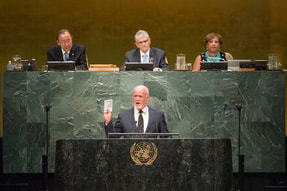 © UN
© UN
The UN’s 71st General Assembly: the world body rolls up its sleeves - NYLESA Magazine
The world’s greatest diplomatic spectacle kicked off in New York City on September 13th with the start of the 71st session of the United Nations General Assembly (UNGA). With an agenda that dissects the world’s main threats (such as the situation in the Middle East); the United Nations’ key challenges (such as strengthening its humanitarian and disaster relief assistance); and the organization’s plans (such as the reduction of military budgets), the work of the United Nations derives largel y from the deliberations, standard-setting and policymaking that take place annually at the UNGA from September to August.
The world’s greatest diplomatic spectacle kicked off in New York City on September 13th with the start of the 71st session of the United Nations General Assembly (UNGA). With an agenda that dissects the world’s main threats (such as the situation in the Middle East); the United Nations’ key challenges (such as strengthening its humanitarian and disaster relief assistance); and the organization’s plans (such as the reduction of military budgets), the work of the United Nations derives largel y from the deliberations, standard-setting and policymaking that take place annually at the UNGA from September to August.
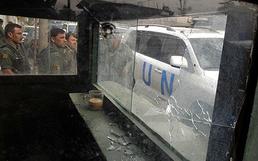 © AFP/Getty
© AFP/Getty
Interview with the Spokesperson of the United Nations Assistance Mission In Afghanistan - UN Dispatch
In the midst of a crossroads for the future of the country, I sat down with Dominic Medley, Spokesperson of the United Nations Assistance Mission in Afghanistan (UNAMA), to discuss the multiple challenges faced by the country and the role of the UN in supporting the Afghan government in achieving peace, stability and prosperity in this battered country.
In the midst of a crossroads for the future of the country, I sat down with Dominic Medley, Spokesperson of the United Nations Assistance Mission in Afghanistan (UNAMA), to discuss the multiple challenges faced by the country and the role of the UN in supporting the Afghan government in achieving peace, stability and prosperity in this battered country.
 © AFP
© AFP
Interview with Western Sahara’s Polisario Front Representative to the United Nations - Middle East Eye
Polisario Front's Ahmed Boukhari says that the UN must stop Moroccan interference in referendum mission or there will be 'no choice' but war.
UN chief Ban Ki-moon last month referred to Morocco's "occupation" of the region - a statement that led to mass protests in Morocco and Rabat ordering the removal of civilian members of the UN Mission for the Referendum in Western Sahara (MINURSO) and the closure of its military liaison office.
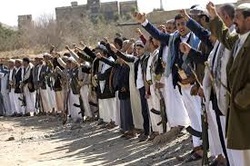
© The Columbian
Yemen is not Paris: western media’s cold shoulder - Open Democracy
Yemen is a failed state devastated by fighting, with thousands of civilians killed by a strong jihadist presence and widespread suffering. It has made very few headlines. The fact that one of the world's poorest and hungriest countries is being fatally hit by man-made mayhem has failed to make a sustained dent in the western media in the way that similar conflicts did.
Yemen is a failed state devastated by fighting, with thousands of civilians killed by a strong jihadist presence and widespread suffering. It has made very few headlines. The fact that one of the world's poorest and hungriest countries is being fatally hit by man-made mayhem has failed to make a sustained dent in the western media in the way that similar conflicts did.
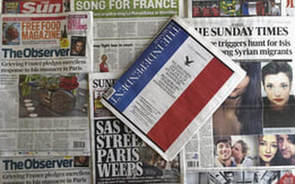
© Shutterstock/Albund
Does the media say too much when reporting on terrorism? - Open Democracy
News coverage of investigations into terrorist attacks raise concerns about whether the media goes too far in reporting police findings that may be of some help to bloodthirsty fundamentalists.
Reporting on police investigations can inadvertently help attackers avoid past miscalculations and refine their modus operandi. Journalists would argue that their job is to protect society's right to know. Yet in such exceptional circumstances, editors should ensure that the latest information they feed to their audience is useless to fundamentalists seeking to do harm.
News coverage of investigations into terrorist attacks raise concerns about whether the media goes too far in reporting police findings that may be of some help to bloodthirsty fundamentalists.
Reporting on police investigations can inadvertently help attackers avoid past miscalculations and refine their modus operandi. Journalists would argue that their job is to protect society's right to know. Yet in such exceptional circumstances, editors should ensure that the latest information they feed to their audience is useless to fundamentalists seeking to do harm.
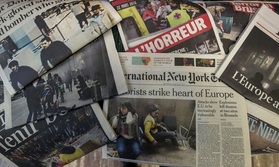
Media is a 'godsend' tool for terrorist - interview with Maja Piscevic - Headlines Everyday
The last few weeks have seen a resurgence of terrorist attacks in Europe claimed by the self-styled Islamic State (IS) group - also known as ISIS. On the one hand, terrorists target civilians confident that their heinous acts will stir ample media attention and provide global visibility and promotion to their ‘causes’ and beliefs. On the other hand, the mass media capitalizes from the consternation caused by terrorist attacks to produce the kind of dramatic news that draws the attention of its viewers and readers. I spoke to Maja Piscevic, vice president and communications director of the EastWest Institute (EWI), to discuss her views on whether mass media and terrorism have become ever more intertwined in a mutually beneficial relationship.
The last few weeks have seen a resurgence of terrorist attacks in Europe claimed by the self-styled Islamic State (IS) group - also known as ISIS. On the one hand, terrorists target civilians confident that their heinous acts will stir ample media attention and provide global visibility and promotion to their ‘causes’ and beliefs. On the other hand, the mass media capitalizes from the consternation caused by terrorist attacks to produce the kind of dramatic news that draws the attention of its viewers and readers. I spoke to Maja Piscevic, vice president and communications director of the EastWest Institute (EWI), to discuss her views on whether mass media and terrorism have become ever more intertwined in a mutually beneficial relationship.
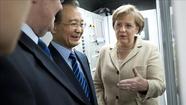
© Steffen Kugler/AFP/Getty Images
Europe’s Bailout Fund: Fears and Hopes of China’s Bill - Social Europe Journal
Over the last four months, China has been claiming that it will help Europe’s financial woes by contributing billions of dollars to the International Monetary Fund (IMF). Recently the G20 finance leaders told Europe that, if the IMF is to fortify the eurozone financial facility, Brussels has to beef it up further. Such a warning provides China with some breathing space. This article sheds light on what Chinese leaders may be weighting up before writing the check.
Over the last four months, China has been claiming that it will help Europe’s financial woes by contributing billions of dollars to the International Monetary Fund (IMF). Recently the G20 finance leaders told Europe that, if the IMF is to fortify the eurozone financial facility, Brussels has to beef it up further. Such a warning provides China with some breathing space. This article sheds light on what Chinese leaders may be weighting up before writing the check.
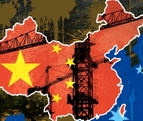
© The West Australian
Scratching the surface of the Chinese Government Procurement mountain - Understanding China
Western firms, and European in particular, are looking increasingly east to revive their dormant profits. China’s massive government procurement market seems like the ideal outlet to do just that. Nevertheless, foreign investors are still handicapped when competing in the Chinese government procurement giant.
Last year marked China’s 10th anniversary of its accession to the World Trade Organisation (WTO), a development doomed to stir up the corridors of the body’s headquarters in Geneva. Such a prediction has not let anybody down.
Western firms, and European in particular, are looking increasingly east to revive their dormant profits. China’s massive government procurement market seems like the ideal outlet to do just that. Nevertheless, foreign investors are still handicapped when competing in the Chinese government procurement giant.
Last year marked China’s 10th anniversary of its accession to the World Trade Organisation (WTO), a development doomed to stir up the corridors of the body’s headquarters in Geneva. Such a prediction has not let anybody down.
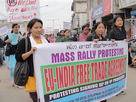
© bloggers.com
The alarmingly uneven deal of the India-EU FTA - Bilaterals
Europe is India’s major trading partner and biggest –real- source of foreign direct investment (FDI), what gives a flavour of the weight that Brussels carries in the Indian economy. In addition, the EU’s gross domestic product is about ten times larger than India’s. In paper, this asymmetry should present equal opportunities as challenges: a remarkable increase in Indian exports to the enormous European market combined with bigger FDI inflows from the continent, whereas European corporations step up or expand their businesses in India. However, a closer look at the course of the India-EU FTA negotiations reveals a different picture. [continue reading]
Europe is India’s major trading partner and biggest –real- source of foreign direct investment (FDI), what gives a flavour of the weight that Brussels carries in the Indian economy. In addition, the EU’s gross domestic product is about ten times larger than India’s. In paper, this asymmetry should present equal opportunities as challenges: a remarkable increase in Indian exports to the enormous European market combined with bigger FDI inflows from the continent, whereas European corporations step up or expand their businesses in India. However, a closer look at the course of the India-EU FTA negotiations reveals a different picture. [continue reading]

© Iwishmynamewa Smarsha
EU-India FTA, the data exclusivity dilemma - Public Service Europe
Conflict between European and Indian pharma industries might be played out again in FTAs with other nations. Early last month, it was announced that data exclusivity will not be part of the prospective European Union-India free trade agreement. Such a provision would have protected clinical test data, impeding generic manufactures who use this material to produce cheap drugs. The move unleashed a wave of criticism from two camps. One side indicating that it still falls short of guaranteeing access to affordable, life-saving medicaments. The other side arguing that it undermines the competitiveness of the Indian pharmaceutical industry.
Conflict between European and Indian pharma industries might be played out again in FTAs with other nations. Early last month, it was announced that data exclusivity will not be part of the prospective European Union-India free trade agreement. Such a provision would have protected clinical test data, impeding generic manufactures who use this material to produce cheap drugs. The move unleashed a wave of criticism from two camps. One side indicating that it still falls short of guaranteeing access to affordable, life-saving medicaments. The other side arguing that it undermines the competitiveness of the Indian pharmaceutical industry.

© Crossed flag-pins
Europe’s plight to punch its weight in North Korea - NK News. DPRK Information Center
May marked the 10th anniversary of official relations between the European Union (EU) and North Korea. Initially seeming a promising relationship, it soon revealed its wobbly foundations when, after just one year, Pyongyang’s violation of its commitments to the International Atomic Energy Agency brought dialogue to a sudden end. Today, North Korea’s nuclear manoeuvres remain an issue of consternation in the EU, holding the key to unlock Brussels ties with Pyongyang.
May marked the 10th anniversary of official relations between the European Union (EU) and North Korea. Initially seeming a promising relationship, it soon revealed its wobbly foundations when, after just one year, Pyongyang’s violation of its commitments to the International Atomic Energy Agency brought dialogue to a sudden end. Today, North Korea’s nuclear manoeuvres remain an issue of consternation in the EU, holding the key to unlock Brussels ties with Pyongyang.

© European Parliament
Interview with MEP Mr Christian Ehler on North Korea - NK News. DPRK Information Center
Last week, a team of the European Union (EU) Humanitarian Aid department initiated a field visit to North Korea aimed at assessing the country’s food shortages. Furthermore, last month marked the 10th anniversary of the European Commission’s (the EU’s executive body) relations with North Korea. Coinciding with these two benchmarks, Javier Delgado Rivera interviews Mr Christian Ehler, a German Member of the European Parliament (MEP) and Chair of the European Parliament Delegation for relations with the Korean Peninsula.
Last week, a team of the European Union (EU) Humanitarian Aid department initiated a field visit to North Korea aimed at assessing the country’s food shortages. Furthermore, last month marked the 10th anniversary of the European Commission’s (the EU’s executive body) relations with North Korea. Coinciding with these two benchmarks, Javier Delgado Rivera interviews Mr Christian Ehler, a German Member of the European Parliament (MEP) and Chair of the European Parliament Delegation for relations with the Korean Peninsula.

© Korean Central News Agency (KCNA)
Korea after reunification: Challenges and opportunities - Opendemocracy
Last year’s deadly rise in tensions in the Korean peninsula put off any prospects of reunification. Young-II Kim, a North Korean defector and executive director of PSCORE, an organisation furthering the understanding between Seoul and Pyongyang, appears more optimistic. In an interview with Javier Delgado Rivera, he dissects the major issues the Korean Peninsula will face when reunification comes about.
For decades, North Korean observers have but failed to predict the breakdown of the Kim Jong-il’s regime. Is it going to be different this time around?
Last year’s deadly rise in tensions in the Korean peninsula put off any prospects of reunification. Young-II Kim, a North Korean defector and executive director of PSCORE, an organisation furthering the understanding between Seoul and Pyongyang, appears more optimistic. In an interview with Javier Delgado Rivera, he dissects the major issues the Korean Peninsula will face when reunification comes about.
For decades, North Korean observers have but failed to predict the breakdown of the Kim Jong-il’s regime. Is it going to be different this time around?
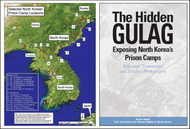
© U.S. Committee Human Rights (DPRK)
North Korea Political Prisoner Camps; an Interview with Tae Jin Kim - Global Politician
Earlier this month, the US State Department released its 2010 Human Rights Report. It portrays the a systematic and severe human rights abuses occurred throughout the [North Korean] prison and detention system" as some of the grimmest violations against humanity anywhere in the world. Coinciding with the launch of the report, Javier Delgado Rivera interviewed Mr Tae Jin Kim, president of Free the NK Gulag, a Seoul-based organisation raising awareness on the North Korean political prisoner camps (Kwan-Li-So in Korean). Mr Kim, a former prisoner himself, provides an illustrating picture of the dire realm of today's Kwan-Li-So.
Earlier this month, the US State Department released its 2010 Human Rights Report. It portrays the a systematic and severe human rights abuses occurred throughout the [North Korean] prison and detention system" as some of the grimmest violations against humanity anywhere in the world. Coinciding with the launch of the report, Javier Delgado Rivera interviewed Mr Tae Jin Kim, president of Free the NK Gulag, a Seoul-based organisation raising awareness on the North Korean political prisoner camps (Kwan-Li-So in Korean). Mr Kim, a former prisoner himself, provides an illustrating picture of the dire realm of today's Kwan-Li-So.

© European Commission
The EU-Korea Free Trade Agreement is a Green Sin - Social Europe
At its last plenary, the European Parliament (EP) ratified the Union’s free trade agreement with the Republic of Korea (EU-ROK FTA), the largest trade deal ever signed by the EU. The accord removes the current 8% tariff on EU cars exported to South Korea and is expected to double the €53 billion bilateral trade in 20 years. The pact was endorsed despite the vote against the Green/EFA and the leftist GUE/NGL Parliamentary Groups, bringing to light the deal’s perceived lack of environmental credentials.
At its last plenary, the European Parliament (EP) ratified the Union’s free trade agreement with the Republic of Korea (EU-ROK FTA), the largest trade deal ever signed by the EU. The accord removes the current 8% tariff on EU cars exported to South Korea and is expected to double the €53 billion bilateral trade in 20 years. The pact was endorsed despite the vote against the Green/EFA and the leftist GUE/NGL Parliamentary Groups, bringing to light the deal’s perceived lack of environmental credentials.
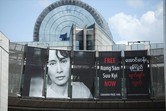
© European Parliament
Europe expresses frustration over Burma’s polls - Europe’s World
Just days after the polls, European leaders’ outrage at the Burmese elections is mounting.
“The EU regrets that the [Burmese] authorities did not take the necessary steps to ensure a free, fair and inclusive electoral process,“ laments Catherine Ashton, European Union (EU) foreign policy chief, in a declaration on the elections in Burma. This statement largely encapsulates the frustration felt in most European quarters towards the uncompromising, stifling environment leading to the ballot box.
Just days after the polls, European leaders’ outrage at the Burmese elections is mounting.
“The EU regrets that the [Burmese] authorities did not take the necessary steps to ensure a free, fair and inclusive electoral process,“ laments Catherine Ashton, European Union (EU) foreign policy chief, in a declaration on the elections in Burma. This statement largely encapsulates the frustration felt in most European quarters towards the uncompromising, stifling environment leading to the ballot box.

Big prospects for the upcoming EU-Singapore FTA - Europe’s World
The recent conclusion of the EU-South Korea Free Trade Agreement (FTA) has turned Brussels’ attention towards the ongoing EU-Singapore FTA negotiations. The Asian city-state is a European key trade partner that gives the continent access to the wider Southeast Asian region. A promising scenario for the recovering, consumers-craving EU firms.
The recent conclusion of the EU-South Korea Free Trade Agreement (FTA) has turned Brussels’ attention towards the ongoing EU-Singapore FTA negotiations. The Asian city-state is a European key trade partner that gives the continent access to the wider Southeast Asian region. A promising scenario for the recovering, consumers-craving EU firms.

© Asia-Europe Meeting
8th Asia-Europe Meeting: A Practical Talking Show - Eurasia Review
Earlier this month, 48 Asian and European leaders met in a summit that, though not decisive, proved conductive in getting both regions to talk about shoring up the slow recovery of the world’s economic health.
The 8th edition of the biannual Asia Europe Meeting (ASEM) agreed that, to sustain the global recovery momentum, market confidence and enhanced trade, under an improved global economic governance, is the way forward.
Earlier this month, 48 Asian and European leaders met in a summit that, though not decisive, proved conductive in getting both regions to talk about shoring up the slow recovery of the world’s economic health.
The 8th edition of the biannual Asia Europe Meeting (ASEM) agreed that, to sustain the global recovery momentum, market confidence and enhanced trade, under an improved global economic governance, is the way forward.

© News CN
EU sends unsound signals to ASEAN Regional Forum - Eurasia Review
The European Union (EU) punched below its weight at an important Asia-Pacific gathering, leaving behind a set of flat statements by its representative, an unexpectedly low-profile EU member state foreign minister. If Brussels is to live up to its nicely-worded rhetoric in its multifaceted ties with Asia, it cannot keep missing opportunities like the last week’s ASEAN Regional Forum.
The European Union (EU) punched below its weight at an important Asia-Pacific gathering, leaving behind a set of flat statements by its representative, an unexpectedly low-profile EU member state foreign minister. If Brussels is to live up to its nicely-worded rhetoric in its multifaceted ties with Asia, it cannot keep missing opportunities like the last week’s ASEAN Regional Forum.
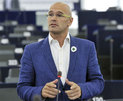
© European Parliament
Spaniard works to keep Burma high on EU agenda - Mizzima News Agency
“There is a pressing urgency to prevent the EU from losing interest in what is going on in Burma” – Spanish Member of the European Parliament, Raul Romeva i Rueda. Ahead of the forthcoming elections in Burma, Raul Romeva i Rueda, a Spanish Member of the European Parliament, spoke to Mizzima in the Brussels seat of the European chamber. He is vice-president of the Greens/European Free Alliance Group, the fourth largest bloc in the European Parliament.
“There is a pressing urgency to prevent the EU from losing interest in what is going on in Burma” – Spanish Member of the European Parliament, Raul Romeva i Rueda. Ahead of the forthcoming elections in Burma, Raul Romeva i Rueda, a Spanish Member of the European Parliament, spoke to Mizzima in the Brussels seat of the European chamber. He is vice-president of the Greens/European Free Alliance Group, the fourth largest bloc in the European Parliament.

© European Parliament
Interview with MEP Robert Goebbels on Burma/Myanmar - Mizzima News Agency
Robert Goebbels, a member of the European Parliament (EP) from Luxembourg, received Mizzima at his office in Brussels. The Socialist member of the EP since 1999 is vice-chairman of the delegation for relations with the countries of Southeast Asia and Asean and has been minister of economic affairs, transport and public works and energy for Luxembourg. He is a member of the Progressive Alliance of Socialists and Democrats group within the EP, the second-largest bloc in the parliament.
Robert Goebbels, a member of the European Parliament (EP) from Luxembourg, received Mizzima at his office in Brussels. The Socialist member of the EP since 1999 is vice-chairman of the delegation for relations with the countries of Southeast Asia and Asean and has been minister of economic affairs, transport and public works and energy for Luxembourg. He is a member of the Progressive Alliance of Socialists and Democrats group within the EP, the second-largest bloc in the parliament.
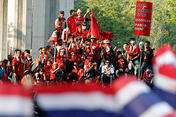
© CS Monitor
Thailand’s Road to Reconciliation - openDemocracy
Weeks after the Thai army ended a bitter nine-week protest by the red shirts in Bangkok, Thailand's Prime Minister Abhisit Vejjajiva is campaigning for reconciliation – a move already burdened with a heavy load of polemic.
With the state of emergency still disrupting the fundamental rights of Thais, the government has commissioned an independent investigation on the rally and its crackdown. The adjective independent has been received with disbelief by wide sectors of the Thai society all too familiar with its elites’ (particularly the army’s) habit of political interference – tendency that had its latest chapter in last December 2008 dissolution of the Thaksin-proxy and then ruling People's Power Party.
Weeks after the Thai army ended a bitter nine-week protest by the red shirts in Bangkok, Thailand's Prime Minister Abhisit Vejjajiva is campaigning for reconciliation – a move already burdened with a heavy load of polemic.
With the state of emergency still disrupting the fundamental rights of Thais, the government has commissioned an independent investigation on the rally and its crackdown. The adjective independent has been received with disbelief by wide sectors of the Thai society all too familiar with its elites’ (particularly the army’s) habit of political interference – tendency that had its latest chapter in last December 2008 dissolution of the Thaksin-proxy and then ruling People's Power Party.
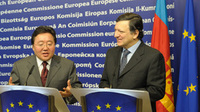
© European Parliament
Mongolia: Elbegdorj Meets European Union Leaders - The UB Post
Mongolia's President Tsakhia Elbegdorj met the European Union's leaders on the first two days of February, in Brussels, Belgium, after attending the World Economic Forum in Davos, Switzerland. Increased EU aid assistance, standardization cooperation and Mongolia'ss recent moratorium on the death penalty were high on the agenda.
Accompanied by Mongolia'ss Foreign Minister and the country's Ambassador in Belgium, Elbegdorj met the three presidents of the Union: Hernan Van Rompuy (European Council), Jerzy Buzek (European Parliament), and Jose Manuel Barroso (European Commission).
Mongolia's President Tsakhia Elbegdorj met the European Union's leaders on the first two days of February, in Brussels, Belgium, after attending the World Economic Forum in Davos, Switzerland. Increased EU aid assistance, standardization cooperation and Mongolia'ss recent moratorium on the death penalty were high on the agenda.
Accompanied by Mongolia'ss Foreign Minister and the country's Ambassador in Belgium, Elbegdorj met the three presidents of the Union: Hernan Van Rompuy (European Council), Jerzy Buzek (European Parliament), and Jose Manuel Barroso (European Commission).
- Even waving a red flag, Viet Nam is not a Communist country anymore - ESJ (EU Commission)
- Mongolia & Vietnam: healthy relationship (co-authored) - The UB Post
- EU- ASEAN Relations: Moving Across Myanmar - ESJ (European Commission)
- Asian masculinisation: when sons are a blessing and daughters a curse - ESJ (EU
- Maoist movement in India and ‘Salwa Judum’ - Asian Tribune
- Mongolia: Still an Unknown Land - ESJ (EU Commission)
- Economic plan to close EU- Mongolia export gap (page 4) - The UB Post
- EU examines Mongolia’s democratic progress (front page) - The UB Post
